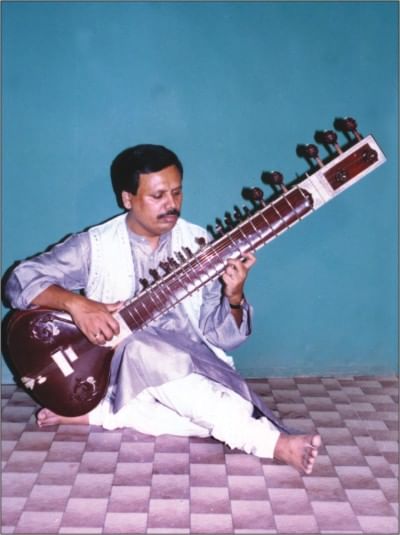No strings attached

Firoz Khan
Music begets music. Both his grown-up sons are aficionados; his wife is an ardent fan too. His father was a staff artiste at Bangladesh Betar in Rajshahi, specialising in numerous instruments; his maternal uncle, Ustad Khurshid Khan was a noted sitar player. While Firoz Khan had no burning ambition to learn the sitar, he bowed to parental wishes and took up the instrument as a child, tempted to follow in his uncle's footsteps by the scope for travel and his rising popularity. He is quietly proud of the National Children's Award bestowed on him when he was only 15 and following hot on its heels, an award for the Rajshahi District competition.
Born in Brahmanbaria in 1963, Firoz had the opportunity to visit Calcutta in early 1971 to further his musical education under the tutelage of his mother's uncle and cousins, sarod players, Ustads Bahadur Hussein Khan, Bidyut and Kirit Khan. Returning home towards the end of that year, Firoz initially took lessons from Khurshid Khan, moving on to Lakshmikanta Dey of the Enayet Khan Saheb Gharana, who remained his guru until the mid-'80s. He was fortunate in his choice, for Lakshmikanta Dey heaped special attention upon him, Firoz reciprocating with hard work and respect. “He concentrated on music to such an extent, dedicated his life to its pursuit, that he never married. His students were like his children. Ours was a father-son relationship and I was with him when he died,” reminisced Firoz.
Kick-started by brief stints at Rajshahi Bangladesh Betar and BTV, Firoz joined Dhaka Betar, where he continues to be a staff artiste. His commitments are widespread, performing in orchestras for advertisements, TV programmes and films, and of course live public and private concerts. To date, the concert with the most magical ambience was on Pakistan National Day a couple of years ago, accompanying Pakistani ghazal singer Ustad Ghulam Ali. “It was a great honour to be requested by the ustad himself, a new experience to be playing live with him. We entertained the audience with an intricate 'sawaal-jawaab' session.” High praise has been showered on Firoz by noted Calcutta singer Haimanti Shukla and Delhi-based kathak dancer Rani Khanam. “Artistes feel comfortable with me, as if we've practising together for years.”
Travelling abroad for the first time in the mid 1990s as part of an artistes' delegation to Amsterdam, Firoz gave tremendous solo performances there, as well as a couple of years later during a Bangladeshi food festival in London. 1996 proved to be a great year for journeys; concerts took Firoz to Switzerland, Austria and Germany. “There were numerous programmes and I got great first-hand exposure to a variety of cultures. The local audience were keen music lovers and extremely hospitable, the Bangladeshis in these places were superb, supportive.” One of the highlights in Firoz's international career was participating in the London Arts Worldwide Bangladesh Festival in 1999. “I met Tony Blair again, having met him previously before he became prime minister.”
While pleased to be considered among the top instrumentalists in the country, Firoz keenly feels the lack of institutional and other support. His dream of establishing a sitar school remains stagnant and he rues the fact that his few students have no ambition to turn professional. “It is a difficult instrument to learn. The sitar needs serious discipline and, understandably, they don't wish to invest time where they are unable to see a future. There should be an academy solely for music; then the young can carry on the tradition. There are simply no opportunities.” Firoz savours a non-existent wish to train further with Indian maestros Manilal Nag and Shahid Parvez Khan, and to bring foreign musicians to teach here. Rather pessimistically, he doesn't foresee a particularly bright future for classical music.
His hands fly across the instrument as if they were disembodied. The audience is enthralled, the applause rapturous. To hear Firoz Khan play live is a treat indeed.
The writer is a freelance contributor.

 For all latest news, follow The Daily Star's Google News channel.
For all latest news, follow The Daily Star's Google News channel. 



Comments